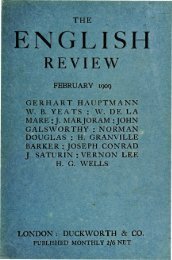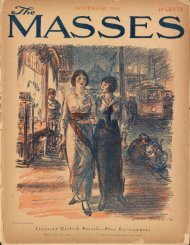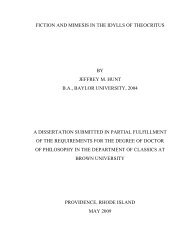View PDF - Brown University Library
View PDF - Brown University Library
View PDF - Brown University Library
- No tags were found...
You also want an ePaper? Increase the reach of your titles
YUMPU automatically turns print PDFs into web optimized ePapers that Google loves.
Lackner, Butz & CompanyIntroduction to Scribner ReadersREAL ESTATE MORTGAGESPECIALISTSOur business is confined to first mortgagereal estate bonds, secured byimproved income - bearing Chicagoproperty. We underwrite issues andcasry them with our own funds untilplaced with investors.FOUNDED 1904LACKNER & BUTZ began loaning onChicago Real Estate in 1904, whenthey took over a long established business.References: First National Bank,Chicago; State Bank of Chicago;Chicago Title & Trust Company.SERVICE FOR INVESTORSWe offer 6% first mortgage bonds, denominations$100, $500, and $1000;maturities one to five years; partialpayment plan or outright investment;and attend to every detail during thelife of the investment.May we send you descriptive literature ofcurrent offerings ?LACKNER butz&companytn w ' INVESTMENT B A N K E R S1 , 1C O N W A Y B U I L D I N G • • • C H I C A G OA S E V E R EC O M P A R I S O NThe investment of the futuremust offer a degree of safetycomparable to the standard setby The Victory Liberty Loanand our previous War Loans.Experienced investment institutionsand conservative privateinvestors now hold over fourbillion dollars in first farm mortgages.Our own company hasnegotiated more than $20,000,-000 of these loans. No investorhas ever lost a dollar throughinvestment in them.These safe investmentsNet You Six Percent.Write for current offeringsand illustrated bookletThe New England Securities Co.CAPITAL & S U R P L U S * 4 0 0 . O O OKansas CityMissouriIContinued from page 70It has been introduced in this country but hasnot met with wide favor. Most amortizedmortgage loans in America are made for a termof five or ten years. A comparatively smallamount, ordinarily about 2 per cent, is paid onthe principal each year so that the reduction ofthe indebtedness amounts to 10 or 20 per cent—about enough to atone for the depreciationof the property. In another typical mortgageloan made under a different system, a loan of$10,000, running for five years, is reduced by apayment of $1,000 at the end of three yearsand $1,500 at the end of four years, leaving atotal of $7,500 coming due at the end of fiveyears. Both these systems are imperfect.They do not entirely meet the first objection,but still they represent an improvement, sincehalf a loaf is better than no bread.In some cities methods of loaning moneyon mortgage are unscientific in the extreme anda direct violation of fundamental rules of soundfinancing. Many borrowers never think ofpaying the principal of their indebtedness atall but renew and renew again at the expirationof each three or five year period, intending thatthe loan shall stand as a sort of perpetual indebtednessagainst the property. This is on theprinciple, as a well-known savings-bank presidentpointed out, of "I'd rather owe it to youall my life than cheat you out of it."Such owners often think themselves ill-usedif the investor insists on a reduction of his indebtedness.And yet it is obvious that thismust be done if he is to be protected, sinceproperty often will deteriorate heavily in aperiod of ten or twenty years.A few years since there was a striking exampleof the evils of this system in New YorkCity. A widow was very largely dependent onthe income of a building in the wholesale districtleased to a large firm. The lease had beenmade years before on a highly favorable basisand represented a net income of approximately10 per cent of a fair valuation of the property.She had mortgaged her property, the loan representingabout 60 per cent of its value, but, inaccordance with this practice, she renewed theloan each time it came due, the mortgagee notinsisting on a reduction. Within a strikinglyshort space of time the character of the neighborhoodchanged. The wholesale firms made awholesale migration to better quarters, thelease expired, and her tenant also moved out.She found herself with an old and run-downproperty on her hands producing no incomewhatever. She managed to meet the interestpayments but when the mortgage came due shecould not pay. The loan went into foreclosure,and as the property had greatly deteriorated in










